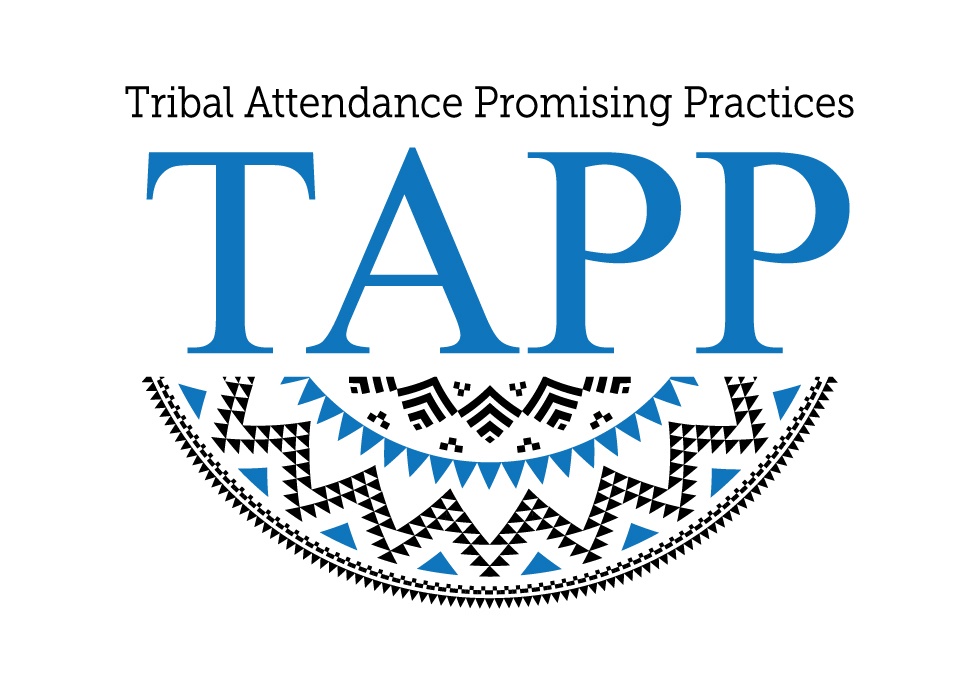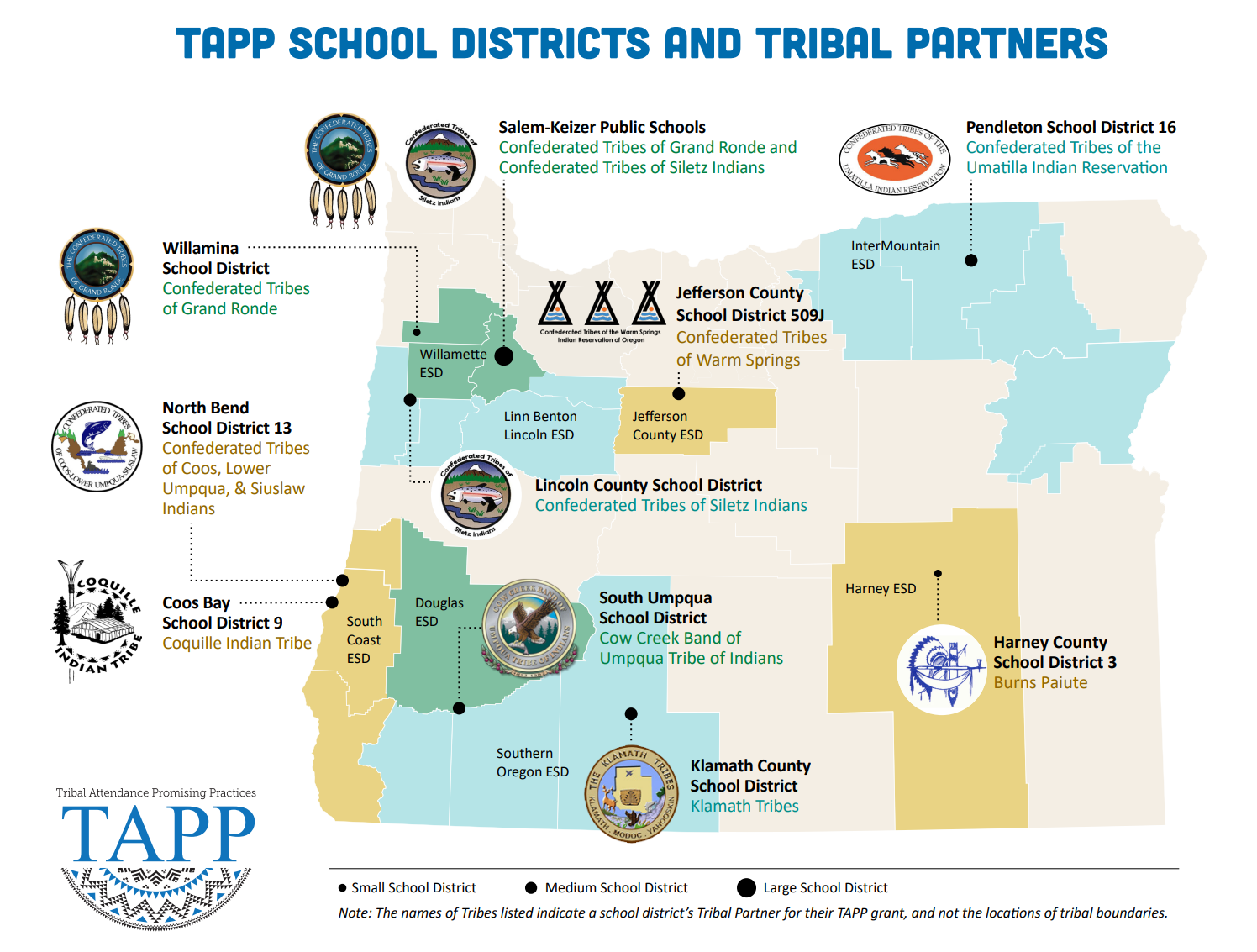Signed Attendance Awareness Month Proclamation
September is Attendance Awareness Month!
The
Every Day Matters Team "seeks to expand systemic support and advocacy to address barriers to attendance and examine and remove the root causes of Chronic Absenteeism, especially for focal student groups, through collaboration across systems both within ODE and with partners across the state." This ODE website includes Attendance Awareness Month resources, year-round support, and research about chronic absenteeism.
Please watch this video introduction from Dr. Charlene Williams available on the ODE YouTube page:
ODE Director Dr. Charlene Williams Celebrates Attendance Awareness Month This September
After the release of the
The Condition of Education for Members of Oregon's Indian Tribes in January 2013, a study from the Chalkboard Project, the Government to Government Education Cluster (comprised of representatives from each of the nine federally recognized Tribes in Oregon) created a Policy Option Package (POP) to solicit state funding to reduce chronic absenteeism of American Indian/Alaska Native students. The study revealed if you were an American Indian/Alaska Native student nearly one-third (33%) in all grades were chronically absent (missing 10% or more of school days). While all other students are at less than one-fifth (19%) chronically absent.

The Oregon legislature set aside funds for the 2023-2025 biennium to operate TAPP projects focused on supporting the attendance of Native students in ten preselected Oregon school districts. TAPP will enable participating districts to receive $190,753.77 for their Family Advocate position, which has deep local connections, to create school-wide initiatives focused on reducing chronic absenteeism.
The intent of the collaboration is to strengthen the links between Oregon Tribes and the schools that serve any student identifying as American Indian/ Alaska Native (AI/AN) , even if the student is not a member of a federally recognized tribe. TAPP differs from Title VI programs in that fundamental way. However, because this is a school-wide initiative, it will positively impact the attendance of every student attending TAPP schools.
"Schools across Oregon, nation grapple with attendance issues"
Rolando Hernandez - December 5, 2023 - OPB
"Last week, a state report showed that 38% of all Oregon students are chronically absent, meaning they miss at least 10% of school days." Charan Cline and Stacy Parrish speak about chronic absenteeism - THINK OUT LOUD Article and Podcast
TAPP Sites

TAPP Program Promising and Best Practices
Since the TAPP Pilot year, our district sites have been deeply committed to the work of the Tribal Attendance Promising Practices grant program. Educators look to our TAPP districts to learn from them just what it takes to increase the attendance of our American Indian/Alaska Native students. While some of the best practices linked below can be readily implemented at any school site, our most “promising practices" are the ones which have required educators and school and district leaders to evaluate systems, structures, policies, and beliefs present in themselves and throughout their complex K-12 ecosystems to determine to what extent they truly serve our AI/AN+ students and center their unique cultural and linguistic needs in their district and school improvement efforts.
Courageously naming, addressing, and working to heal the historical trauma of settler colonialism – the impacts of land theft, reservations, broken treaties, the attempted genocide of culture and languages with the boarding school era, and the devastating impacts of Indian termination policies on the lineages of entire families still today – is really the work of TAPP. The document below uplifts a fraction of these promising practices happening across our various TAPP sites. Our deep gratitude and appreciation goes out to them as they engage in this work each and every day at 28 school sites in ten school districts across the state of Oregon.
Attendance Works - Foundational Supports interview Questions
The Tribal Attendance Promising Practices program is built off of the research-based methods from Attendance Works. In our TAPP monthly meetings this year, we have been learning more about the
Three Tiers of Intervention, especially about the importance of “Foundational Supports”. For any TAPP Family Advocate or any support staff member who leads regular attendance efforts who would like to learn more about the foundational supports in place at their school, these interview questions can help guide them.
TAPP Promising and Best Practices Comprehensive Resource
Every Day Matters website -
Includes Attendance Awareness month resources; NEW updates and formatting as of September of 2024
McKinney Vento, TAPP, and Title VI Indian Education Support Document
Setting the TAPP Family Advocate Up for Success - Self Assessment -
This assessment is aligned to Section Two of the TAPP Promising and Best Practices Comprehensive Resource up above.
Culturally Responsive Tiered Attendance Systems - Self Assessment
This assessment is aligned to Section Four of the TAPP Promising and Best Practices Comprehensive Resource up above.
TAPP Summer Learning Series
Session 1: Creating the conditions to support American Indian and Alaska Native Students with Attendance
Summer TAPP Session 1 Slidedeck and Summer TAPP Session 1 Recording (coming soon)
Session 2: Culturally responsive tiered attendance systems for AI/AN students: Refining and retooling
Summer TAPP Session 2 Slidedeck and Summer TAPP Session 2 Recording (coming soon)
Trainings for TAPP Districts for 2024-2025
Sept. 26, 2024 TAPP Quarterly Webinar #1
Sept. 2024 TAPP Family Advocate Monthly Meeting
October TAPP Family Advocate Monthly Meeting
November TAPP Family Advocate Monthly Meeting
November 21, 2024 TAPP Quarterly Webinar #2
December TAPP Family Advocate Monthly Meeting
Trainings for TAPP Districts for 2023-2024
TAPP Family Advocate Monthly Meeting - September
TAPP Quarterly Webinar #1 - September 21, 2023
TAPP Family Advocate monthly Meeting - October
TAPP Quarterly Webinar #2 - November 30, 2023
Every Day Matters Training - November 30 - Foundations of Family Engagement
TAPP Family Advocate Monthly Meeting - December 2023
TAPP Family Advocate Monthly Meeting - February 2024
TAPP Quarterly Webinar #3 - Februrary 8, 2024
TAPP Family Advocate Monthly Meeting - March 2024
TAPP Family Advocate Monthly Meeting - May 2024
2023 TAPP Symposium
The Tribal Attendance Promising Practices Program held an end of year symposium for all TAPP Project Directors, Family advocates, Tribal Partners and esteemed guests. This event had the honor of hosting the
Native Wellness Institute and
Spoken Word Poet Shuina Sko who created a one of a kind poem you will find linked below. We would like to thank all who traveled near and far to attend the 2023 TAPP Symposium and we will be looking forward to hosting next years event! Please enjoy the photos taken from the symposium along with the Best Practices Slide show from our TAPP Family Advocates.
TAPP Symposium Photos
Poem:
"Family is Us" by Shuina Sko
TAPP Family Advocates Best Practices Slide Show
OIE TAPP 2022 Fall Site Visit
Fall Comprehensive Report
*TAPP Best Practices in the report can be found on pg. 33-44
2021-2022 TAPP Training (Archive)
Our 2021-2022 TAPP Training was a success. We enjoyed the presentations shared by three inspiring guest speakers. You may access materials and view the recorded training below: